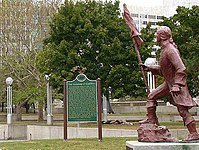Antoine de la Mothe Cadillac, Date of Birth, Place of Birth, Date of Death
TweetAntoine de la Mothe Cadillac
French explorerAbout Antoine de la Mothe Cadillac
- Antoine Laumet de la Mothe, sieur de Cadillac (, French: [kadijak]; March 5, 1658 – October 16, 1730), usually referred to as Antoine de la Mothe Cadillac (also spelled Motte), was a French explorer and adventurer in New France which stretched from Eastern Canada to Louisiana on the Gulf of Mexico.
- He rose from a modest beginning in Acadia in 1683 as an explorer, trapper, and a trader of alcohol and furs, and he achieved various positions of political importance in the colony.
- He was the commander of Fort de Buade in St.
- Ignace, Michigan in 1694.
- In 1701, he founded Fort Pontchartrain du Détroit (which became the city of Detroit); he was commandant of the fort until 1710.
- Between 1710 and 1716, he was the governor of Louisiana, although he did not arrive in that territory until 1713.His knowledge of the coasts of New England and the Great Lakes area was appreciated by Frontenac, governor of New France, and Pontchartrain, Secretary of State for the Navy.
- This earned him various favors, including the Order of Saint Louis from King Louis XIV.
- The Jesuits in Canada, however, accused him of perverting the Indians with his alcohol trading, and he was imprisoned for a few months in Quebec in 1704, and again in the Bastille on his return to France in 1717.Upon his arrival in America, La Mothe adopted his title after the town of Cadillac, Gironde in southwestern France.
- The city of Detroit became the world center of automobile production in the 20th century.
- William H.
- Murphy and Henry M.
- Leland founded the Cadillac auto company and paid homage to him by using his name for their company and his self-created armorial bearings as its logo in 1902.
- Various places bear his name in America, in particular Cadillac Mountain in Maine and the town of Cadillac, Michigan. He was widely hailed as a hero until the 1950s and the rise of liberal scholarship, but more recent writers have not admired him.
- Zoltvany claims that "he most definitely was not one of the 'great early heroes' and probably deserves to be ranked with the 'worst scoundrels ever to set foot in New France'."
Read more at Wikipedia


 Date of Birth:
Date of Birth:  Place of Birth: Saint-Nicolas-de-la-Grave, Occitania, France
Place of Birth: Saint-Nicolas-de-la-Grave, Occitania, France